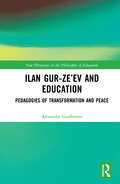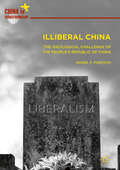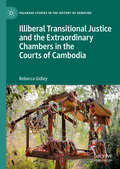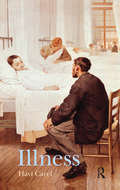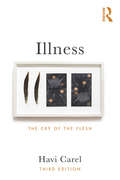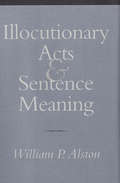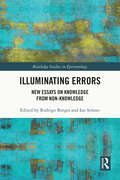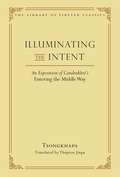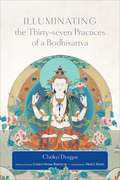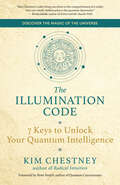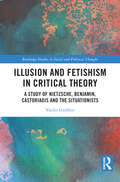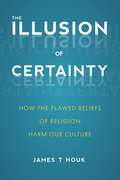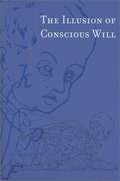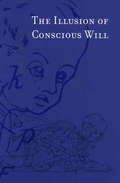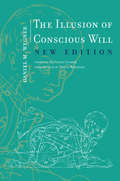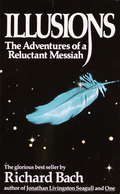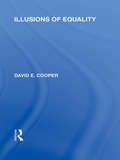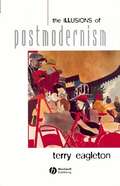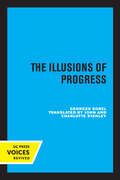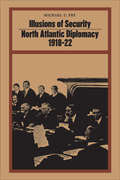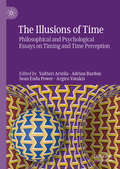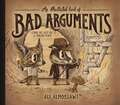- Table View
- List View
Il libro dell'Anima
by Antonio Almas Monja ArenielloLa poesia non riguarda solo la fonetica, dove le parole devono fare rima e le frasi hanno una struttura rigorosa. La poesia è tutta una questione di sensi, in cui ogni frase è come un attore che recita una scena, per un pubblico affamato di sentimenti. Il segreto di questa rappresentazione è di stimolare l'immaginazione del lettore, in modo da permettergli di disegnare ogni scenario nella dimensione dei suoi sogni. Veramente, la poesia è la capacità di creare nuovi universi.
Ilan Gur-Ze’ev and Education: Pedagogies of Transformation and Peace (New Directions in the Philosophy of Education)
by Alexandre GuilhermeIlan Gur-Ze'ev and Education: Pedagogies of Transformation and Peace critically analyses and introduces the main ideas of Ilan Gur-Ze’ev, reflecting on his continuing theoretical and practical relevance to the field of education. This book offers an accessible, higher-level critical discussion on the thought of Ilan Gur-Ze'ev with an impressive breadth and contemporary focus. The book focuses on Gur-Ze'ev's 'counter-pedagogy' project, which brought him much attention and attempts to establish an alternative and non-dogmatic form of education. Gur Ze'ev's views go against 'critical pedagogy' and 'neoliberalism', because while the former advocates achieving a utopia in which there is no oppression, the latter defends the idea that 'wants and desires' need to be satisfied through a process of 'marketisation'. This book brings to notice Gur-Ze’ev’s concepts of ‘counter-education’ and 'diasporic education' which seek to pursue the truth in everyday life, rather than achieving a utopian goal, or the promised land. This unique and up-to-date monograph will be of great interest for researchers, academics, and postgraduate students in the fields of philosophy of education, theory of education, peace education, Jewish education, neoliberalism, and sociology of education.
Illiberal China: The Ideological Challenge of the People's Republic of China (China in Transformation)
by Daniel F. VukovichThis book analyzes the 'intellectual political culture' of post-Tiananmen China in comparison to and in conflict with liberalism inside and outside the P.R.C. How do mainland politics and discourses challenge ‘our’ own, chiefly liberal and anti-‘statist’ political frameworks? To what extent is China paradoxically intertwined with a liberal economism? How can one understand its general refusal of liberalism, as well as its frequent, direct responses to electoral democracy, universalism, Western media, and other normative forces? Vukovich argues that the Party-state poses a challenge to our understandings of politics, globalization, and even progress. To be illiberal is not necessarily to be reactionary and vulgar but, more interestingly, to be anti-liberal and to seek alternatives to a degraded liberalism. In this way Chinese politics illuminate the global conjuncture, and may have lessons in otherwise bleak times.
Illiberal Transitional Justice and the Extraordinary Chambers in the Courts of Cambodia (Palgrave Studies in the History of Genocide)
by Rebecca GidleyThis book examines the creation and operation of the Extraordinary Chambers in the Courts of Cambodia (ECCC), which is a hybrid domestic/international tribunal tasked with putting senior leaders of the Khmer Rouge on trial. It argues that the ECCC should be considered an example of illiberal transitional justice, where the language of procedure is strongly adhered to but political considerations often rule in reality. The Cambodian government spent nearly two decades addressing the Khmer Rouge past, and shaping its preferred narrative, before the involvement of the United Nations. It was a further six years of negotiations between the Cambodian government and the United Nations that determined the unique hybrid structure of the ECCC. Over more than a decade in operation, and with three people convicted, the ECCC has not contributed to the positive goals expected of transitional justice mechanisms. Through the Cambodian example, this book challenges existing assumptions and analyses of transitional justice to create a more nuanced understanding of how and why transitional justice mechanisms are employed.
Illness: The Cry of the Flesh (The Art of Living)
by Havi CarelWhat is illness? Is it a physiological dysfunction, a social label, or a way of experiencing the world? How do the physical, social and emotional worlds of a person change when they become ill? And can there be well-being within illness? In this remarkable and thought-provoking book, Havi Carel explores these questions by weaving together the personal story of her own serious illness with insights and reflections drawn from her work as a philosopher. Carel's fresh approach to illness raises some uncomfortable questions about how we all - whether healthcare professionals or not - view the ill and challenges us to become more thoughtful. 'Illness' unravels the tension between the universality of illness and its intensely private, often lonely, nature. It offers a new way of looking at a matter that affects every one of us.
Illness: The Cry of the Flesh (Philosophie Concrete Ser.)
by Havi CarelWhat is illness? Is it a physiological dysfunction, a social label, or a way of experiencing the world? How do the physical, social, and emotional worlds of a person change when they become ill? Can there be well-being within illness? In this remarkable and thought-provoking book, Havi Carel explores these questions by weaving together the personal story of her own illness with insights and reflections drawn from her work as a philosopher. Carel’s fresh approach to illness raises some uncomfortable questions about how we all – whether healthcare professionals or not – view the ill, challenging us to become more thoughtful. Illness unravels the tension between the universality of illness and its intensely private, often lonely, nature. It offers a new way of looking at a matter that affects every one of us. Revised and updated throughout, the third edition of this groundbreaking volume includes a new chapter on organ transplantation. Illness: The Cry of the Flesh will prove essential reading to those studying philosophy, medical ethics, and medical anthropology, as well as those in the healthcare and medical professions. It will also be of interest to individuals who live with illness, and their friends and families.
Illocutionary Acts and Sentence Meaning
by William P. AlstonWhat is it for a sentence to have a certain meaning? This is the question that the distinguished analytic philosopher William P. Alston addresses in this major contribution to the philosophy of language. His answer focuses on the given sentence's potential to play the role that its speaker had in mind, what he terms the usability of the sentence to perform the illocutionary act intended by its speaker. Alston defines an illocutionary act as an act of saying something with a certain "content." He develops his account of what it is to perform such acts in terms of taking responsibility, in uttering a sentence, for the existence of certain conditions. In requesting someone to open a window, for example, the speaker takes responsibility for its being the case that the window is closed and that the speaker has an interest in its being opened. In Illocutionary Acts and Sentence Meaning, Alston expands upon this concept, creating a framework of five categories of illocutionary act and going on to argue that sentence meaning is fundamentally a matter of illocutionary act potential; that is, for a sentence to have a particular meaning is for it to be usable to perform illocutionary acts of a certain type. In providing detailed and explicit patterns of analysis for the whole range of illocutionary acts, Alston makes a unique contribution to the field of philosophy of language--one that is likely to generate debate for years to come.
Illuminating Errors: New Essays on Knowledge from Non-Knowledge (Routledge Studies in Epistemology)
by Rodrigo Borges Ian SchneeThis is the first collection of essays exclusively devoted to knowledge from non-knowledge and related issues. It features original contributions from some of the most prominent and up-and-coming scholars working in contemporary epistemology. There is a nascent literature in epistemology about the possibility of inferential knowledge based on premises that are, for one reason or another, not known. The essays in this book explore if and how epistemology can accommodate cases where knowledge is generated from something other than knowledge. Can reasoning from false beliefs generate knowledge? Can reasoning from unjustified beliefs generate knowledge? Can reasoning from gettiered beliefs generate knowledge? Can reasoning from propositions one does not even believe generate knowledge? The contributors to this book tackle these and other questions head-on. Together, they advance the debate about knowledge from non-knowledge in novel and interesting directions. Illuminating Errors will be of interest to researchers and advanced students working in epistemology and philosophy of mind.
Illuminating Errors: New Essays on Knowledge from Non-Knowledge (Routledge Studies in Epistemology)
by Rodrigo Borges Ian SchneeThis is the first collection of essays exclusively devoted to knowledge from non-knowledge and related issues. It features original contributions from some of the most prominent and up-and-coming scholars working in contemporary epistemology.There is a nascent literature in epistemology about the possibility of inferential knowledge based on premises that are, for one reason or another, not known. The essays in this book explore if and how epistemology can accommodate cases where knowledge is generated from something other than knowledge. Can reasoning from false beliefs generate knowledge? Can reasoning from unjustified beliefs generate knowledge? Can reasoning from gettiered beliefs generate knowledge? Can reasoning from propositions one does not even believe generate knowledge? The contributors to this book tackle these and other questions head-on. Together, they advance the debate about knowledge from non-knowledge in novel and interesting directions. Illuminating Errors will be of interest to researchers and advanced students working in epistemology and philosophy of mind.
Illuminating the Intent: An Exposition of Candrakirti's Entering the Middle Way (Library of Tibetan Classics #19)
by Thupten JinpaThe Dalai Lama&’s translator and author of the definitive biography of Tsongkhapa here presents the first translation of one of that master&’s seminal and best-known works.This work is perhaps the most influential explanation of Candrakirti&’s seventh-century classic Entering the Middle Way (Madhyamakavatara). Written as a supplement to Nagarjuna&’s Fundamental Verses on the Middle Way, Candrakirti&’s text integrates the central insight of Nagarjuna&’s thought—the rejection of any metaphysical notion of intrinsic existence—with the well-known Mahayana framework of the ten levels of the bodhisattva, and it became the most studied presentation of Madhyamaka thought in Tibet. Completed the year before the author&’s death, Tsongkhapa&’s exposition of Candrakirti&’s text is recognized by the Tibetan tradition as the final standpoint of Tsongkhapa on many philosophical questions, particularly the clear distinctions it draws between the standpoints of the Madhyamaka and Cittamatra schools. Written in exemplary Tibetan, Tsongkhapa&’s work presents a wonderful marriage of rigorous Madhyamaka philosophical analysis with a detailed and subtle account of the progressively advancing mental states and spiritual maturity realized by sincere Madhyamaka practitioners. The work remains the principal textbook for the study of Indian Madhyamaka philosophy in many Tibetan monastic colleges, and it is a principal source for many Tibetan teachers seeking to convey the intricacies of Madhyamaka philosophy to non-Tibetan audiences. Though it is often cited and well known, this is the first full translation of this key work in a Western language.
Illuminating the Thirty-Seven Practices of a Bodhisattva
by Chokyi Dragpa Chokyi Nyima Rinpoche Heidi I. KopplA unique presentation of the Buddhist path by Chökyi Dragpa, the foremost Gelug disciple of the famed nineteenth-century Tibetan master Patrul Rinpoche.Illuminating the Thirty-Seven Practices of a Bodhisattva's quotations and direct instructions from realized sages of the past reinforce one another, subtly penetrating the mind and preparing it for meditation. This book, while fully accessible to newcomers, is especially powerful for serious, established practitioners. Illuminating the Thirty-Seven Practices of a Bodhisattva was previous published under the title Uniting Wisdom and Compassion.
The Illumination Code: 7 Keys to Unlock Your Quantum Intelligence
by Kim Chestney“Kim Chestney’s codes bring you closer to the comprehension of a reality that was wholly hidden prior to the quantum discoveries.” — Ervin László, author of Science and the Akashic Field Intuition — the extraordinary ability to access information from the quantum realms — is fast becoming humanity’s most advanced form of knowledge acquisition. The Illumination Code presents seven keys to unlock your inner dimension so you can access expanded states of awareness that exist beyond the limits of the rational mind. Kim Chestney reveals the deeply personal nature of the universe while offering a new way to know the unknowable and experience the seemingly impossible. As you venture inward on this step-by-step journey, you will gain profound insights and discover the true power of your own inner wisdom.
Illusion and Fetishism in Critical Theory: A study of Nietzsche, Benjamin, Castoriadis and the Situationists (Routledge Studies in Social and Political Thought)
by Vasilis GrolliosThrough the negative dialectics of Theodore Adorno, Illusion and Fetishism in Critical Theory offers an examination of Nietzsche, Benjamin, Castoriadis and the Situationists, who put the concept of illusion at the forefront of their philosophical thought. Vasilis Grollios argues that these political philosophers, except Castoriadis, have up to now been wrongly considered by many scholars to be far from the line of thinking of negative dialectics, Critical Theory and the early Frankfurt School/Open Marxist tradition. He illustrates how these thinkers focused on the illusions of capitalism and attempted to show how capitalism, by its innate rationale, creates social forms that are presented as unavoidable and universal, yet are historically specific and of dubious sustainability. Providing a unique overview of concepts including illusion, totality, fetishization, contradiction, identity thinking and dialectics, Grollios expertly reveals how their understanding of critique can help us open cracks in capitalism and radicalize democratic social practice today. Illusion and Fetishism in Critical Theory is a must read for scholars of political theory and political philosophy, critical theory, the Frankfurt School, sociology and democratic theory.
The Illusion of Certainty: How the Flawed Beliefs of Religion Harm Our Culture
by James T. HoukIn this examination of religion's influence on society, an anthropologist critiques fundamentalism and all mindsets based on rigid cultural certainties. The author argues that the future can only be safeguarded by a global humanistic outlook that recognizes and respects differing cultural perspectives and endorses the use of critical reason and empiricism. Houk coins the term "culturalism" to describe dogmatic viewpoints governed by culture-specific values and preconceived notions. Culturalism gives rise not only to fundamentalism in religion but also stereotypes about race, gender, and sexual orientation.Turning specifically to Christian fundamentalism, the author analyzes the many weaknesses of what he calls a faith-based epistemology, particularly as such thinking is displayed in young-earth creationism, the reliance on revelation and subjective experiences as a source of religious knowledge, and the reverence accorded the Bible despite its obvious flaws. As he points out, the problem with such cultural knowledge generally is that it is non-falsifiable and ultimately has no lasting value in contrast to the data-based and falsifiable knowledge produced by science, which continues to prove its worth as a reliable source of accurate information.Concluding that there is no future to the fundamentalist mindset in a diverse world where religion often exacerbates conflicts, he makes a strong case for reason and mutual tolerance.
The Illusion of Conscious Will
by Daniel M. WegnerSelected as a Finalist in the category of Psychology/Mental Health in the 2002 Independent Publisher Book Awards (IPPYs) presented by Independent Publisher Magazine, Silver Award Winner for Philosophy in the 2002 Fore Word Magazine Book of the Year Awards, and Selected as an Outstanding Academic Book for 2002 by Choice Magazine. Do we consciously cause our actions, or do they happen to us? Philosophers, psychologists, neuroscientists, theologians, and lawyers have long debated the existence of free will versus determinism. In this book Daniel Wegner offers a novel understanding of the issue. Like actions, he argues, the feeling of conscious will is created by the mind and brain. Yet if psychological and neural mechanisms are responsible for all human behavior, how could we have conscious will? The feeling of conscious will, Wegner shows, helps us to appreciate and remember our authorship of the things our minds and bodies do. Yes, we feel that we consciously will our actions, Wegner says, but at the same time, our actions happen to us. Although conscious will is an illusion, it serves as a guide to understanding ourselves and to developing a sense of responsibility and morality. Approaching conscious will as a topic of psychological study, Wegner examines the issue from a variety of angles. He looks at illusions of the will--those cases where people feel that they are willing an act that they are not doing or, conversely, are not willing an act that they in fact are doing. He explores conscious will in hypnosis, Ouija board spelling, automatic writing, and facilitated communication, as well as in such phenomena as spirit possession, dissociative identity disorder, and trance channeling. The result is a book that sidesteps endless debates to focus, more fruitfully, on the impact on our lives of the illusion of conscious will.
The Illusion of Conscious Will (The\mit Press Ser.)
by Daniel M. WegnerA novel contribution to the age-old debate about free will versus determinism.Do we consciously cause our actions, or do they happen to us? Philosophers, psychologists, neuroscientists, theologians, and lawyers have long debated the existence of free will versus determinism. In this book Daniel Wegner offers a novel understanding of the issue. Like actions, he argues, the feeling of conscious will is created by the mind and brain. Yet if psychological and neural mechanisms are responsible for all human behavior, how could we have conscious will? The feeling of conscious will, Wegner shows, helps us to appreciate and remember our authorship of the things our minds and bodies do. Yes, we feel that we consciously will our actions, Wegner says, but at the same time, our actions happen to us. Although conscious will is an illusion, it serves as a guide to understanding ourselves and to developing a sense of responsibility and morality.Approaching conscious will as a topic of psychological study, Wegner examines the issue from a variety of angles. He looks at illusions of the will—those cases where people feel that they are willing an act that they are not doing or, conversely, are not willing an act that they in fact are doing. He explores conscious will in hypnosis, Ouija board spelling, automatic writing, and facilitated communication, as well as in such phenomena as spirit possession, dissociative identity disorder, and trance channeling. The result is a book that sidesteps endless debates to focus, more fruitfully, on the impact on our lives of the illusion of conscious will.
The Illusion of Conscious Will, New Edition (The\mit Press Ser.)
by Daniel M. WegnerA new edition of Wegner's classic and controversial work, arguing that conscious will simply reminds of us the authorship of our actions.Do we consciously cause our actions, or do they happen to us? Philosophers, psychologists, neuroscientists, theologians, and lawyers have long debated the existence of free will versus determinism. With the publication of The Illusion of Conscious Will in 2002, Daniel Wegner proposed an innovative and provocative answer: the feeling of conscious will is created by the mind and brain; it helps us to appreciate and remember our authorship of the things our minds and bodies do. Yes, we feel that we consciously will our actions, Wegner says, but at the same time, our actions happen to us. Although conscious will is an illusion (“the most compelling illusion”), it serves as a guide to understanding ourselves and to developing a sense of responsibility and morality. Wegner was unable to undertake a second edition of the book before his death in 2013; this new edition adds a foreword by Wegner's friend, the prominent psychologist Daniel Gilbert, and an introduction by Wegner's colleague Thalia Wheatley.Approaching conscious will as a topic of psychological study, Wegner examines cases both when people feel that they are willing an act that they are not doing and when they are not willing an act that they in fact are doing in such phenomena as hypnosis, Ouija board spelling, and dissociative identity disorder.Wegner's argument was immediately controversial (called “unwarranted impertinence” by one scholar) but also compelling. Engagingly written, with wit and clarity, The Illusion of Conscious Will was, as Daniel Gilbert writes in the foreword to this edition, Wegner's “magnum opus.”
The Illusion of Well-Being: Economic Policymaking Based on Respect and Responsiveness
by Mark D. WhiteThe use of measures of economic output to guide policymaking has been criticized for decades because of their weak ties to human well-being. Recently, many scholars and politicians have called for measures of happiness or subjective well-being to be used to guide policy in people's true interests. In The Illusion of Well-Being, Mark D. White explains why using happiness as a tool for policymaking is misguided and unethical. Happiness is too vague a term to define, and too general a concept, to measure in a way that captures people's true feelings. He extends this critique to well-being in general and concludes that no measure of well-being can do justice to people's true interests, which are complex, multifaceted, and subjective. White suggests instead that policymaking be conducted according to respect and responsiveness, promoting the true interests of citizens while addressing their real needs, and devoting government resources to where they can do the most good.
Illusions: The Adventures of a Reluctant Messiah
by Richard BachIn the cloud-washed airspace between the cornfields of Illinois and blue infinity, a man puts his faith in the propeller of his biplane. For disillusioned writer and itinerant barnstormer Richard Bach, belief is as real as a full tank of gas and sparks firing in the cylinders...until he meets Donald Shimoda--former mechanic and self-described messiah who can make wrenches fly and Richard's imagination soar....In Illusions, the unforgettable follow-up to his phenomenal bestseller Jonathan Livingston Seagull, Richard Bach takes to the air to discover the ageless truths that give our souls wings: that people don't need airplanes to soar...that even the darkest clouds have meaning once we lift ourselves above them... and that messiahs can be found in the unlikeliest places--like hay fields, one-traffic-light midwestern towns, and most of all, deep within ourselves.
Illusions of Equality (International Library Of The Philosophy Of Education)
by David CooperEducational policy and discussion, in Britain and the USA, are increasingly dominated by the confused ideology of egalitarianism. David E. Cooper begins by identifying the principles hidden among the confusions, and argues that these necessarily conflict with the ideal of educational excellence - in which conflict it is this ideal that must be preserved. He goes on to criticize the use of education as a tool for promoting wider social equality, focussing especially on the muddles surrounding 'equal opportunities', 'social mix' and 'reverse discrimination'. Further chapters criticize the 'new egalitarianism' favoured, on epistemological grounds, by various sociologists of knowledge in recent years and 'cultural egalitarianism' according to which standard criteria of educational value merely reflect parochial and economic interests.
The Illusions of Postmodernism
by Terry EagletonIn this brilliant critique, Terry Eagleton explores the origins and emergence of postmodernism, revealing its ambivalences and contradictions. Above all he speaks to a particular kind of student, or consumer, of popular "brands" of postmodern thought.
The Illusions of Progress
by Georges SorelThis title is part of UC Press's Voices Revived program, which commemorates University of California Press’s mission to seek out and cultivate the brightest minds and give them voice, reach, and impact. Drawing on a backlist dating to 1893, Voices Revived makes high-quality, peer-reviewed scholarship accessible once again using print-on-demand technology. This title was originally published in 1969.
Illusions of Security: North Atlantic Diplomacy 1918-22
by Michael FryThe First World War was in many ways the most formative experience for the western world in the twentieth century. Little if anything of importance escaped its influence. For those who helped shape foreign and deference policies in Britain, the United States, and Canada, the war and the consequent peacemaking raised perplexing political, ideological, and racial problems. In their search for solutions, some among the anglophone elites of these three countries arrived at the idea of Atlanticism. To them it seemed possible that the British empire and the United States, the core of the victorious allied coalition, could create a global hegemony, an amended version of the Pax Britannica, which might provide a panacea for the ills of the postwar world. As their views became known, the Atlanticists met with some enthusiasm and much outright hostility. Deliberations for and against Atlanticism focused on renewal of the Anglo-Japanese alliance and on two vital postwar conferences, the Imperial Conference of 1921 and the Washington Conference of 1921-2. Initial prospects for Atlanticism seemed encouraging, but hopes were dashed in real political issues of war debts and European recovery by the end of 1922. The Atlanticist thesis languished and despite periods of co-operation it never regained its appeal throughout the interwar years. Michael Fry relates in fascinating detail the history of these deliberations and of the statesmen who worked for and against Atlanticism. His study sheds light on the evolution of foreign policy in Britain, the dominions, and the United States, and yields insights into relations between these governments during an important time in history.
The Illusions of Time: Philosophical and Psychological Essays on Timing and Time Perception
by Adrian Bardon Valtteri Arstila Sean Enda Power Argiro VatakisThis edited collection presents the latest cutting-edge research in the philosophy and cognitive science of temporal illusions. Illusion and error have long been important points of entry for both philosophical and psychological approaches to understanding the mind. Temporal illusions, specifically, concern a fundamental feature of lived experience, temporality, and its relation to a fundamental feature of the world, time, thus providing invaluable insight into investigations of the mind and its relationship with the world. The existence of temporal illusions crucially challenges the naïve assumption that we can simply infer the temporal nature of the world from experience. This anthology gathers eighteen original papers from current leading researchers in this subject, covering four broad and interdisciplinary topics: illusions of temporal passage, illusions and duration, illusions of temporal order and simultaneity, and the relationship between temporal illusions and the cognitive representation of time.
An Illustrated Book of Bad Arguments: Learn The Lost Art Of Making Sense (Bad Arguments #0)
by Ali Almossawi“This short book makes you smarter than 99% of the population. . . . The concepts within it will increase your company’s ‘organizational intelligence.’. . . It’s more than just a must-read, it’s a ‘have-to-read-or-you’re-fired’ book.”—Geoffrey James, INC.com From the author of An Illustrated Book of Loaded Language, here’s the antidote to fuzzy thinking, with furry animals! Have you read (or stumbled into) one too many irrational online debates? Ali Almossawi certainly had, so he wrote An Illustrated Book of Bad Arguments! This handy guide is here to bring the internet age a much-needed dose of old-school logic (really old-school, a la Aristotle). Here are cogent explanations of the straw man fallacy, the slippery slope argument, the ad hominem attack, and other common attempts at reasoning that actually fall short—plus a beautifully drawn menagerie of animals who (adorably) commit every logical faux pas. Rabbit thinks a strange light in the sky must be a UFO because no one can prove otherwise (the appeal to ignorance). And Lion doesn’t believe that gas emissions harm the planet because, if that were true, he wouldn’t like the result (the argument from consequences). Once you learn to recognize these abuses of reason, they start to crop up everywhere from congressional debate to YouTube comments—which makes this geek-chic book a must for anyone in the habit of holding opinions.

